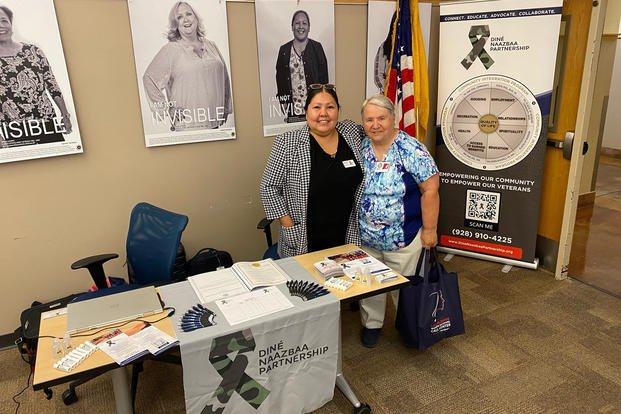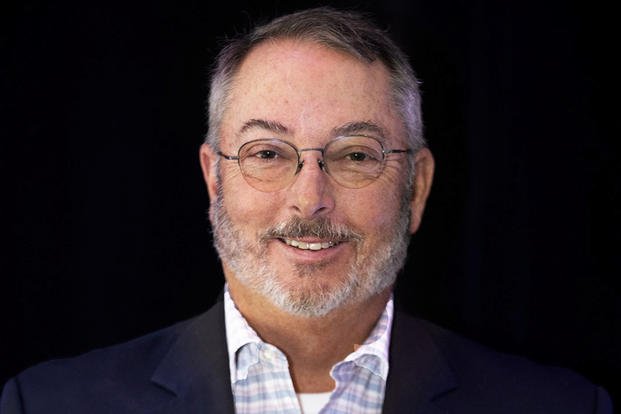During his 22-year military career, first as an Air Force reservist and then on active duty, Jim Lorraine tended to service members during harrowing moments.
Lorraine was a flight nurse, and that need to help stuck with him long after he took off his service uniform for the last time.
"I believed strongly that the narrative of veterans being broken and disabled wasn't accurate, that veterans gave communities probably their greatest hope for success in the long term," Lorraine told Military.com in a phone interview.
Lorraine founded America's Warrior Partnership (AWP) -- a nonprofit that constructs a network of resources to aid veterans in an attempt to prevent suicide -- in 2014. According to its data, AWP handled more than 1,600 total cases that involved 2,921 vets, 1,349 family members and 546 caregivers in 2021. The 2022 numbers are expected to be released in March 2023, Lorraine said.
A total of 6,146 veterans killed themselves in 2020, a 5.3% decline from the previous year, the Department of Veterans Affairs' 2022 National Veteran Suicide Prevention Annual Report revealed. While a study by America's Warrior Partnership claims the VA's numbers through the years have been significantly underreported, the VA is standing by its findings.
"We look at suicide prevention in America's Warrior Partnership as not a singular, mental health intervention or a cause," Lorraine said. "Suicide is an outcome of hopelessness, and hopeless veterans can be from failing relationships, being unhappy with their jobs, careers, financial insecurity. ... We don't believe that mental health is the only solution. It takes looking at the problem broadly to address it."

Lorraine said America's Warrior Partnership, which is based in Augusta, Georgia, does that by leaning on two primary pillars. The first is a community integration program powered by five AWP branches, including the Alaska Warrior Partnership; the Diné Naazbaa Partnership, serving the Navajo Nation; the Indy Warrior Partnership in Indiana; the Panhandle Warrior Partnership in Florida; and the Permian Warrior Partnership in Texas and New Mexico; and four AWP affiliates, in Georgia, California, South Carolina and western New York.
Those branches and affiliates develop relationships with vets by discussing opportunities to enhance their quality of life, advocating for them and collaborating with outside agencies for resource referral. They have impacted more than 56,000 veterans over the years, with an estimated economic impact of close to $300 million, the most recent AWP organizational report showed.
The America's Warrior Partnership Network forms the second pillar. Formed in 2018, this network of about 70 national service providers springs into action if a veteran's issue can't be satisfactorily addressed locally.
"We stay in touch with the veteran that we serve," Lorraine said. "... It's not just, 'Hey, I'm homeless. I need a house.' 'Here's a house.' No, no, it's, 'OK, let's talk about why you are homeless. What are the barriers to you becoming housed? How do we fix those barriers?'"
Keith Manley, the program lead for the Panhandle Warrior Partnership (PWP), said his organization sometimes leans on unconventional methods to meet vets who may be struggling. One of those methods is sponsoring youth football teams where vets who are parents of young children may congregate.
"Our biggest thing is outreach, going out and finding veterans who don't necessarily want to be found," Manley told Military.com.
PWP works with several agencies to assist vets, including CareerSource Okaloosa Walton; Okaloosa and Walton counties are in the Florida Panhandle. That relationship is roughly a decade old, and CareerSource Okaloosa Walton has eight staff members dedicated to aiding vets with employment issues.
Its veterans program manager, Ken Wallace, said the support of the Panhandle Warrior Partnership -- and, by extension, AWP -- has proved invaluable.
"If they weren't in the picture, pretty much you'd be running around in circles," Wallace, an Army vet, told Military.com. "There are a lot of organizations out there to help veterans, but you need to know who to target. By using the Panhandle Warrior connection, they can connect you to the right people. Time is the crucial element, so knowing the right person to talk to is a key element."
While Lorraine is pleased about the progress that America's Warrior Partnership has made in the past decade, he realizes it is not enough. News organizations write stories regularly about the mental health struggles of service members and vets. The issue has not abated despite the efforts of many, including Lorraine.
He said he cannot rest, not as long as there is a veteran out there who needs help.
"We can do better," Lorraine said. "We can do better by working together, but what you find in the veteran space is very few organizations -- especially even across government to non-government -- collaborate. Very few. Government does government; collaboration is minimal. Nonprofits do nonprofits. The collaboration, we're trying to get there.
"We created the network, because we knew the communities knew who the veterans were and knew what they needed, but didn't have the resources. Great national programs had the resources, had the capacity to serve, but they didn't know who to serve. The network was there to bridge the gap between the two. We want to do more in that scope and in that frame, but it takes a coalition of the willing to do it."
Veterans and service members experiencing a mental health emergency can contact the Veteran Crisis Line at 988, Press 1. They also can text 838255 or chat online at VeteransCrisisLine.net.
-- Stephen Ruiz can be reached at stephen.ruiz@military.com.
Stay On Top of Your Veteran Benefits
Military benefits are always changing. Keep up with everything from pay to health care by subscribing to Military.com, and get access to up-to-date pay charts and more with all latest benefits delivered straight to your inbox.












